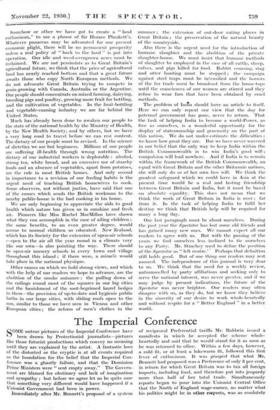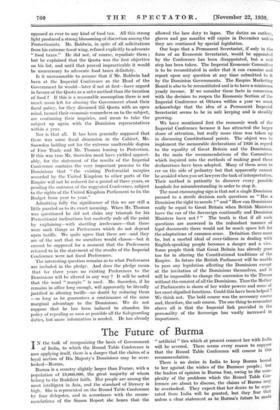The Imperia 1 Conference
SOME untrue pictures of the Imperial Conference have been drawn by Protectionist journalists—pictures like those futurist productions which convey no meaning until they are explained by the artist. A fantastic love of the distorted or the cryptic is at all events required as the foundation for the belief that the Imperial Con- ference was a ghastly failure, and that the Dominion Prime Ministers were " sent empty away." The Govern- ment are blamed for obstinacy and lack of imagination and sympathy ; but before we agree let us be quite sure that something very different would have happened if a Unionist Government had been in power.
Immediately after Mr. Bennett's proposal of a system of reciprocal Preferential tariffs Mr. Baldwin issued a manifesto in which he accepted the scheme whole- heartedly and said that he would stand for it as soon as he was returned to office. Within a few days, however, a cold fit, or at least a lukewarm fit, followed this first fever of enthusiasm. It was grasped that what Mr.. Bennett had proposed was a Preference of only 8 per cent, in return for which Great Britain was to tax all foreign imports, including food, and therefore put into jeopardy more than half of her total trade. Simultaneously reports began to pour into the Unionist Central Office that the North of England wage-earner, no matter what his politics might be in other respects, was as resolutely opposed as ever to any kind of food tax. All this strong light produced a strong blossoming of discretion among the Protectionists. Mr. Baldwin, in spite of all solicitations from his extreme fiscal wing, refused explicitly to advocate " food taxes." He did not, of course, repudiate them ; but he explained that the Quota was the first objective on his list, and until that proved impracticable it would be unnecessary to advocate food taxes definitely.
Is it unreasonable to assume that if Mr. Baldwin had been at the Imperial Conference as the Head of the Government he would—later if not at first—have argued in favour of the Quota as a safer method than the taxation of food ? If this is a reasonable assumption there is not much room left for abusing the Government about their fiscal policy, for they discussed the Quota with an open mind, turned their economic researchers on to the subject, are continuing their inquiries, and mean to take the subject up again with the Dominion representatives within a year.
Nor is that all. It has been generally supposed that there was some fiscal dissension in the Cabinet, Mr. Snowden holding out for the extreme unalterable dogma of Free Trade and Mr. Thomas leaning to Protection. If this was true Mr. Snowden must have yielded appreci- ably, for the statement of the results of the Imperial Conference contains the very important promise to the Dominions that " the existing Preferential margins accorded by the United Kingdom to other parts of the Empire will not be reduced for a period of three years, or pending the outcome of the suggested Conference, subject to the rights of the United Kingdom Parliament to fix the Budget from year to year."
Admitting fully the significance of this we are still a little puzzled as to its exact meaning. When Mr. Thomas was questioned he did not claim any triumph for his Protectionist inclinations but modestly rode off the point by explaining—with startling irrelevance—that there were such things as Preferences which do not depend upon tariffs. We quite agree that there are—and they are of the sort that we ourselves would choose—but it cannot be supposed for a moment that the Preferences referred to in the statement of the results of the Imperial Conference were not fiscal Preferences.
The interesting question remains as to what Preferences are included in the pledge. And does the pledge mean that for three years no existing Preferences to the Dominions will be altered in any way ? It will be noted that the word " margin " is used. Mr. Snowden, if he remains in office long enough, will apparently be literally justified in altering tariffs—no doubt by reducing them —so long as he guarantees a continuance of the same marginal advantage to the Dominions. We do not suppose that he has been induced to abandon his policy of repealing as soon as possible all the Safeguarding duties, but more information is needed. He has already allowed the lace duty to lapse. The duties on cutlery, gloves and gas mantles will expire in December unless they are continued by special legislation.
Our hope that a Permanent Secretariat, if only in the form of an Economic Secretariat, would be appointed by the Conference has been disappointed, but a real step has been taken. The Imperial Economic Committee is to be reconstituted in order that it can examine and report upon any question at any time submitted to it by the Dominion Governments. The Empire Marketing Board is also to be reconstituted and is to have a minimum yearly income. If we consider these facts in connexion with the decision to reopen the Economic Section of the Imperial Conference at Ottawa within a year we must acknowledge that the idea of a Permanent Imperial Secretariat seems to be in safe keeping and is steadily growing.
We have mentioned first the economic work of the Imperial Conference because it has attracted the larger share of attention, but really more time was taken up in discussing Constitutional points. The object was to implement the memorable declarations of 1926 in regard to the equality of Great Britain and the Dominions. In the main the recommendations of the Committee which inquired into the methods of making good those declarations have been adopted. Many of them seem to err on the side of pedantry but that apparently cannot be avoided when you set lawyers the task of interpretation. Their method is patiently to discover every possible loophole for misunderstanding in order to stop it.
The most encouraging sign is that not a single Dominion pressed to a sterile decision such questions as " Has a Dominion the right to secede ? " and "How can Dominions really be equal to Great Britain when British Ministers have the ear of the Sovereign continually and Dominion Ministers have not ? " The truth is that if all such questions are answered in the redundant manner of legal documents there would not be much space left for the adaptations of common sense. Definition there must be, but a morbid ideal of over-tidiness in dealing with English-speaking people becomes a danger and a vice. Some people think that Great Britain has already gone too far in altering the Constitutional traditions of the Empire. In future the British Parliament will be unable to pass any legislation affecting the Dominions except at the invitation of the Dominions themselves, and it will be impossible to change the succession to the Throne without the consent of all the Dominions. Thus the Mother of Parliaments is shorn of her wider powers and some of her most dignified functions. Could this have been helped ?
We think not. The bold course was the necessary course and, therefore, the safe course. The one thing to remember above all is that the Imperial link provided in the personality of the Sovereign has vastly increased in importance.



















































































 Previous page
Previous page